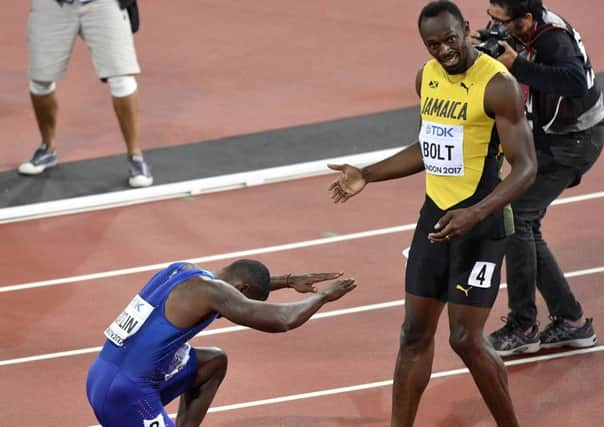Nick Westby: Bolt vs Gatlin is no simple tale of hero and villain


But the case of Justin Gatlin versus Usain Bolt, of Gatlin versus athletics, is not as black and white as simply saying one man is a drugs cheat and the other the ultimate role model.
There is a lot more to the story of Justin Gatlin than the two words that accompany every mention of his name and led to the chorus of boos that greeted his narrow victory over Bolt in the 100m final at the World Athletics Championships on Saturday night.
Advertisement
Hide AdAdvertisement
Hide AdThat derision from inside the stadium echoed what many were thinking around the world.
Saturday night should have been all about one man, the final gold-medal winning act to the greatest career in athletics.
Bolt is the superstar of his sport, the fastest man ever, with a personality to rival that of Muhammad Ali.
He is also clean. Of the 30 quickest times in 100m history, only nine have been run by a clean athlete, all of them by Bolt.
Advertisement
Hide AdAdvertisement
Hide AdFor the last 15 years he has been athletics’ knight in shining armour – its hero. But every hero needs a villain, and Gatlin has so often been cast in that light, mainly by the media.
There is good reason to distrust Gatlin, given he has served two bans for doping violations in an era when performance-enhancing drug abuse is the stain which athletics cannot remove.
He was first banned in 2001 for two years when he tested positive for traces of an amphetamine contained in medication for attention deficit disorder he had been taking since he was a child.
Back then there were regulations in place for the use of the medication during competition, but not out of competition. Gatlin was found to have complied by that and not used the medication in competition, though there were minute traces left within his blood stream when he tested positive.
Advertisement
Hide AdAdvertisement
Hide AdThe governing bodies were compelled to act but the ban was later reduced to one year.
Gatlin then served a four-year ban from 2006 – reduced from eight after he helped the US Government against doping – for testing positive for testosterone.
Again he denied doping, insisting the positive result came when a therapist he was in a legal dispute with rubbed testosterone cream on him – a claim the therapist has also refuted.
Gatlin accepted the consequences of the ban and later became the only track and field athlete to provide undercover assistance to the authorities during the investigation into the BALCO laboratory scandal in which a network of dopers was revealed.
Advertisement
Hide AdAdvertisement
Hide AdWhether you believe him or not, the explanations at least show that labelling someone as a drugs cheat – as has been convenient with Gatlin – is not always a black and white issue.
His lack of remorse adds to the villainous image, but if he is certain he is innocent, why apologise?
He did not break any rules on Saturday night. According to the laws of the International Association of Athletics Federation (IAAF) he had as much right to be on that track as Bolt or anyone.
Gatlin had served his time.
But because of the Bolt effect, the outpouring of love for one man, Gatlin is held up in an era tainted by Russia being banned from competition for systematic doping as the poster boy for drug abuse. The bad boy of athletics.
Advertisement
Hide AdAdvertisement
Hide AdAsked about that reputation in the wake of winning a second world 100m title, Gatlin responded: “What do I do that makes me a bad boy?
“Do I talk bad about anybody? Do I give bad gestures? I don’t.
“It seems like the media want to sensationalise it and make me a bad boy because Usain is the hero.
“That’s fine, I know you’ve got to have a black hat and a white hat, but come on.”
Even Bolt stood up for his rival.
Advertisement
Hide AdAdvertisement
Hide Ad“Justin has done his time over the years and has proven himself over and over again,” said the Jamaican. “For me he deserves to be here because he’s done his time.”
Much of the fault lies at the door of the IAAF. Instead of brushing the issue under the carpet as they tried on Sunday night by bringing Gatlin’s medal ceremony forward to avoid a repeat of the booing, they should confront the issue head on.
Lord Coe admitted it was not ‘ideal’ that someone who had served two bans had won the sport’s most glittering prize and his hardline stance with Russia shows he is willing to eradicate doping, but many pundits want more: lifetime bans for drug cheats.
But does that come in after one offence, or two? Do people deserve a second chance to learn from their mistakes, or a third in the case of the new 100m world champion?
Justin Gatlin is a victim of the system. Boo that and the governing body – not him.